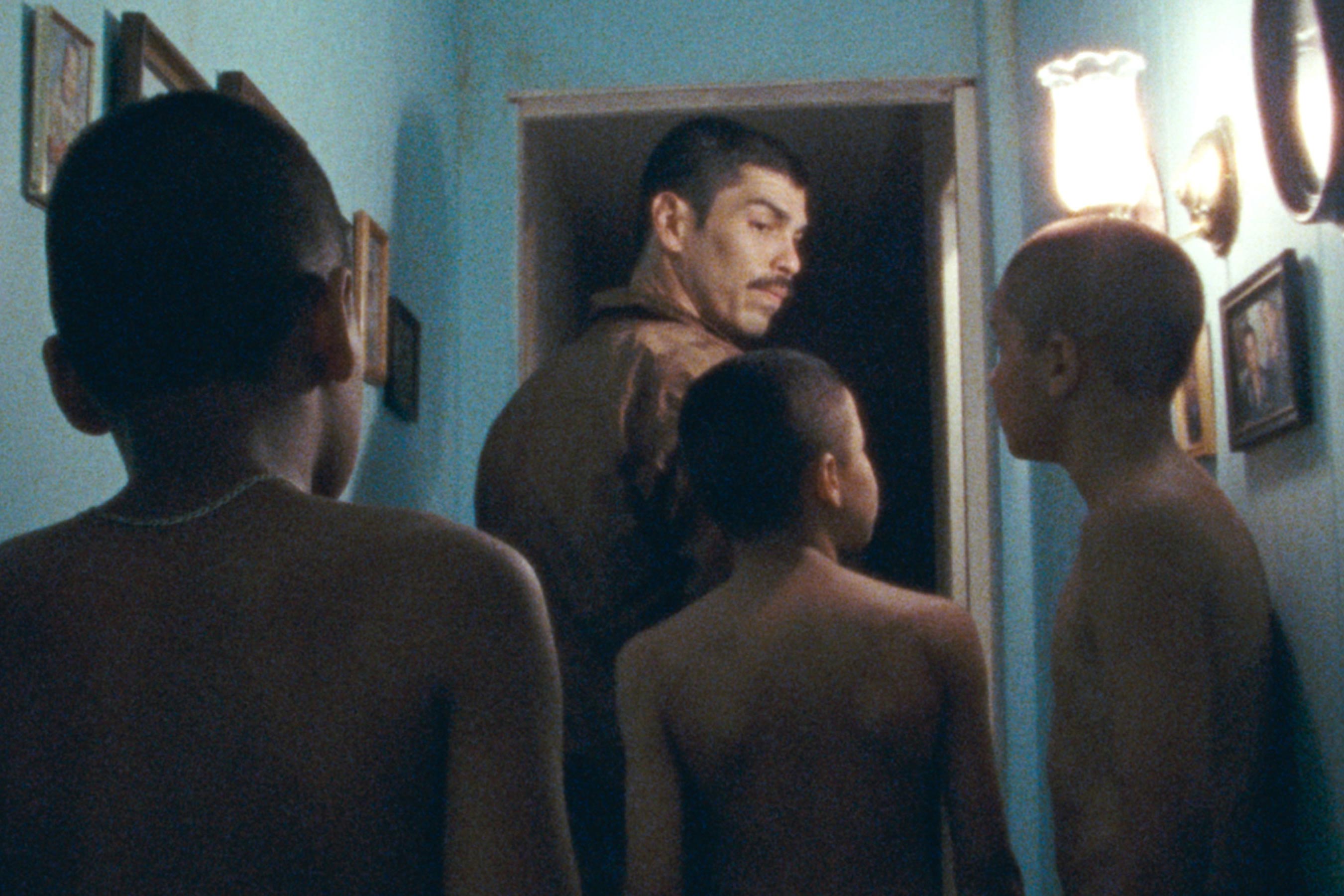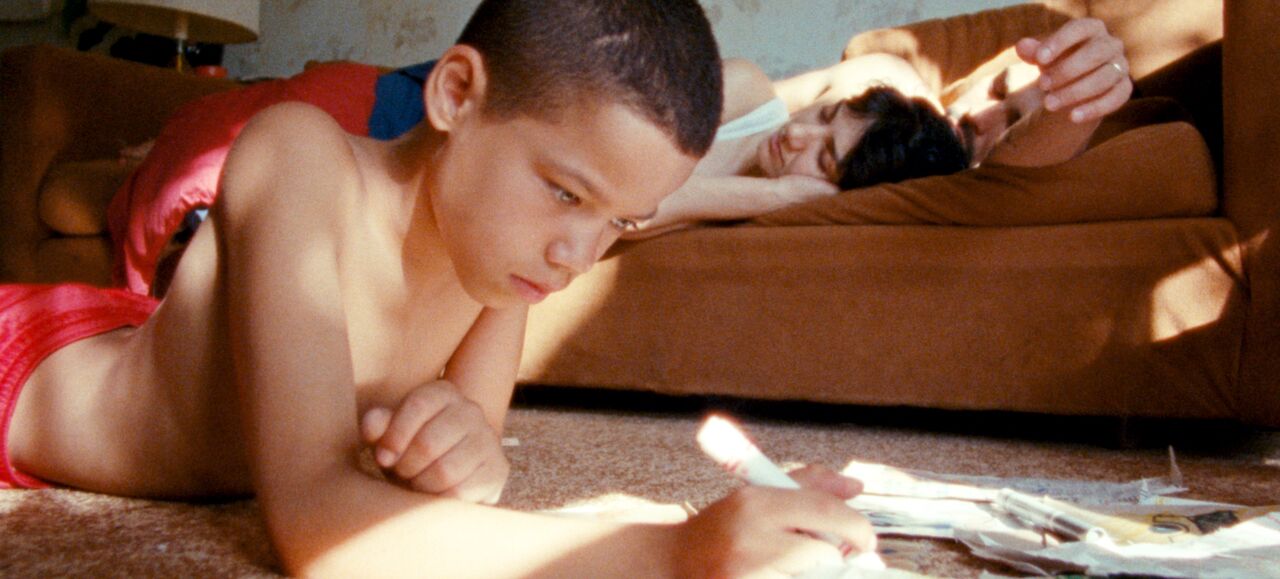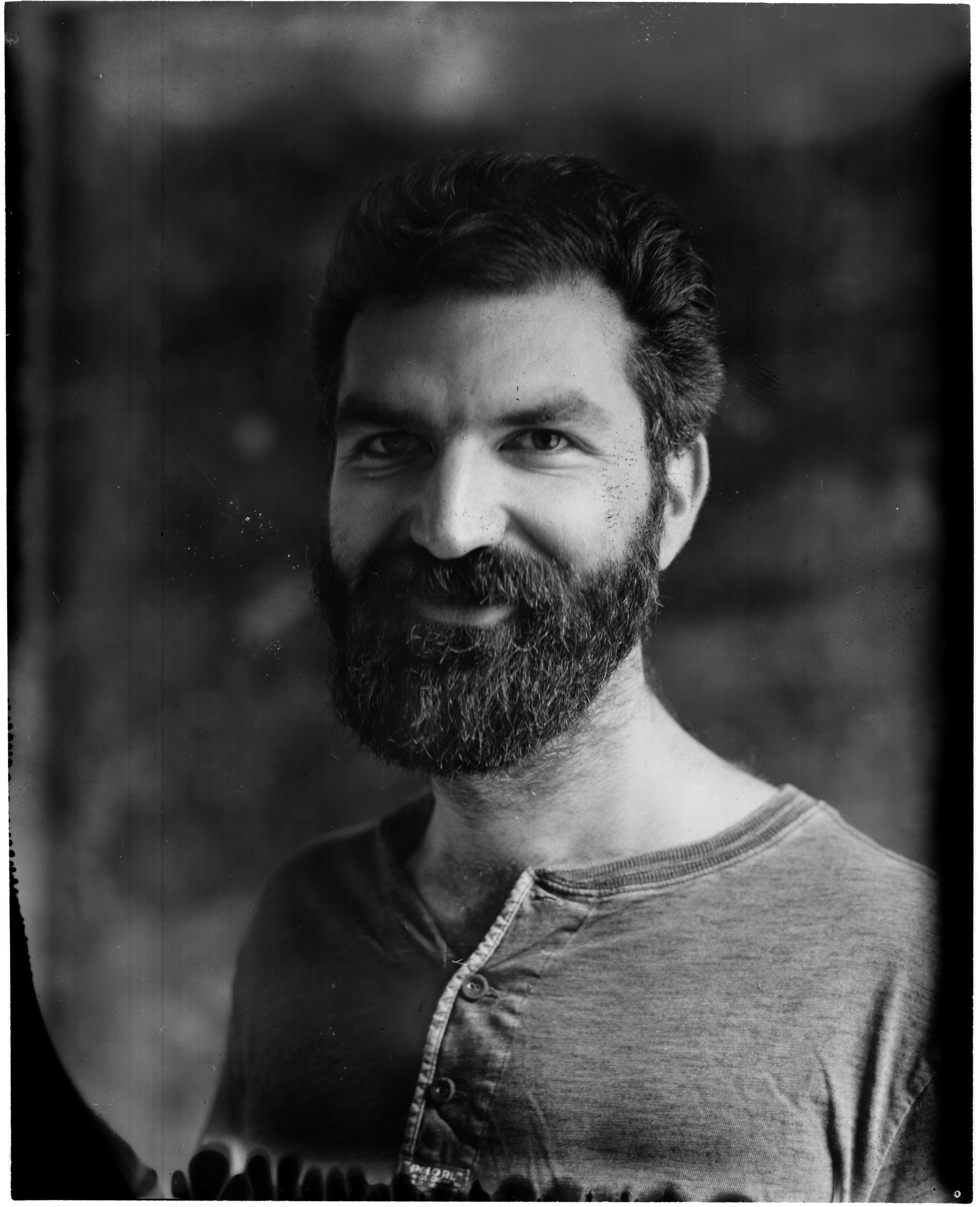Interview: We the Animals' Jeremiah Zagar
 Thursday, August 16, 2018 at 9:40PM
Thursday, August 16, 2018 at 9:40PM 
We the Animals has been compared to Moonlight (2016), The Tree of Life (2011) and Beasts of the Southern Wild (2012). While the comparison is reductive it provides a shorthand for describing this film. It’s a story of three young brothers - one of whom is queer - and their relationships with each other and with their unpredictable parents. There are elements of magical realism in a story grounded in the economic desperation of a working class family in upstate New York.
Raul Castillo (HBO’s Looking) and Sheila Vand (A Girl Walks Home Alone At Night) give perceptive performances as the adults. However it is newcomer Evan Rosado, playing the central character of Jonah, who’ll take your breath away. More sensitive and conscious than his older siblings, Jonah increasingly embraces an imagined world in the secret journals in which writes and sketches. It is an assured narrative debut from documentary filmmaker Jeremiah Zagar. We loved the film when it played Tribeca last spring. We had the chance to speak to Zagar recently in New York.
The interview has been edited and condensed for clarity.

Murtada Elfadl: You've said that you read the book in one sitting while still at a bookshop, before even buying it. What popped in the book for you and made you want to make it into a film?
Jeremiah Zagar: Literally the first page of the book is so visceral, rhythmic and immersive that I couldn’t stop reading it. Beyond that it felt like something I knew how to visualize. I read a lot of books but very few where I feel that I know how to make them into a movie. Somehow I felt this connection to the material that wasn’t only emotional, it was technical almost. I didn't want to change it at all, I just wanted to figure out how to put it on screen. I could see it, I could hear it, I could feel it in my head before it happened...
How do you go from that to writing it?
First I met with Justin [Torres, the author of the book] and I told him how I wanted to make the movie.
What was your pitch to him?
I said we are going to get a bunch of non-actors. We are going to put them together and see what they would do. We will have them do the lines but we’d also just make them live together. And he loved that. It wasn’t exactly what we did but the spirit of that was maintained. Then I called my friend Dan Kitrosser, a wonderful playwright who’s gay. I’m not gay. Justin and I felt that it was very important for it to be a queer movie.
Dan had a journal as a boy that was discovered, like it happens in the movie. He had a very intimate attachment to the book. He loved the story. We did the translation together. There’s a relationship that Jonah has with Dustin that’s not fleshed out in the book. It was one of the bigger elements that we added. A lot of that is Dan bringing his experience of falling in love [when young].
You mean Jonah’s relationship with the older long-haired blond boy with whom he has a crush?
Yes.

I was going to bring that up, because presenting desire for a pre-pubescent kid can be tricky. If this was a French movie maybe but we haven’t seen that in American movies.
We wanted to create a movie that dealt with child sexuality in an honest and frank way, that felt real. And to your point, why haven’t I seen that in American movies? When I watch Ratcatcher or 1900 or Tomboy I see it. Movies where young people experience sex in a way that I had. Why are kids in American movies just running around solving crimes? That doesn’t make any sense. What we are actually doing when we are young is figuring out who we are and part of that is understanding who we are sexually. Part of it is the confusion and complications of sexuality. The people we see that first in are our parents. What was exciting about the book is that it reminded me of being young and seeing my parents sexually for the first time and thinking this is so strange. How does that translate to me and how do I interpret it? Also feelings about pornography, which is in the movie. Kids have complicated confused ideas about sex.
How do you write with a partner? Did you write together?
To be honest Dan did most of the writing. He's a wonderful writer. We would talk it out. Dan would write it, I would make lunch. Then I would edit the scene, add things. Then Dan would write it again, passing the material back and forth. Mostly Dan overwrites and I underwrite. We are a good team.

We read the book in my queer book club and everyone loved it. The book has many fans. Are you apprehensive of the fans' reaction?
Not at all. I’m excited. There might be some people who are not thrilled with the changes we made to the book. But the truth is the author [Justin Torres] was on board every step of the way. We made the best translation of the book that we could possibly make. It’s a translation to the screen, not an adaptation. A lot of people that have come up to me love both the book and the film and that is meaningful to me.
They are separate but equal. The othering of Jonah by his brothers and parents is a theme that resonates, especially with queer audiences. How did you think of presenting that?
It is a queer experience to feel othered. It’s also a universal experience. As a child I felt very alone. There was an important moment in my life where I was able to process and chronicle that loneliness for myself and that freed me. That theme of chronicling one’s life in order to free oneself, that is vital and allows “the other” their place in the pack. That’s what's so beautiful about the book. It presents these dual desires; to free ourselves and to be part of something. It’s about coming to terms with those two desires.
Both the book and film flirt with magical realism while staying grounded in realities like economic desperation. How do you maintain a tone that straddles both?
The book had done it so well, so it was always our map. Magical realism fails when presented as a dream. When we experience something magical, we experience it as real, it’s part of our reality. What Justin has done in the book is creating a mythology and a rhythm and a world that is real. It’s not part of the world of the reader, but it's a whole world unto itself. In that world he’s able to break rules of time, space and physicality. We did the same in the movie, so as long as we remained part of that world we created, we could go anywhere.
Time is fluid, it’s not clear over how long the story takes place.
The film is a memory of a dream. It is timeless. It’s taking place in the 90s over a period of 9 or 10 months but it’s supposed to feel amorphous, like a fever dream.
I understand you storyboarded every single shot. Yet at the same time you got natural fluid performances from your cast. How did you mesh those two elements together?
The more prepared you are, the more free you are to deviate from the preparation. You have so little time when making an independent film, that you have to be structured in order to be free. We had all the elements we needed to allow us freedom within a scene. The actors felt free to do anything they wanted as long as we hit all the things we knew we needed. We are not spending time finding the shot, we have it.
In these times we are living in, some filmmakers feel a responsibility to push socio-political messages with their work. While this film is based on a book published a few years ago, it will be viewed as an agenda film in some circles because of the subject matter.
I’ve been thinking a lot about this. Five years ago, my answer would’ve been no. I don't feel politicized at all. When I picked up the book, it wasn’t a political act. But now we find ourselves in a time where every act of creating work that challenges the disturbing status quo of the United States of America is a political act. Watching the movie is a political act, making the book into a movie is a political act. More people would see it, more people would feel it, more people would have empathy and love for these characters marginalized within our society. It is now a political act.

We the Animals is now open in New York and Los Angeles, expanding to more cities in the next few weeks.



Reader Comments (4)
Great interview! I loved this film at the Sydney Film Festival earlier this year, and tracked down the book at my library.
Thoroughly enjoyed this interview. I love the ending especially because it feels wholly true that just being a good person and telling a human story (natural instincts for many, thankfully) is suddenly politicized because the world has basically gone to hell these past few years.
interesting to hear that he's not queer, especially since the movie is so sensitive to queerness.
This movie looks so amazing that I'm not going to read anything about it until I see it.
I CAN'T WAIT!